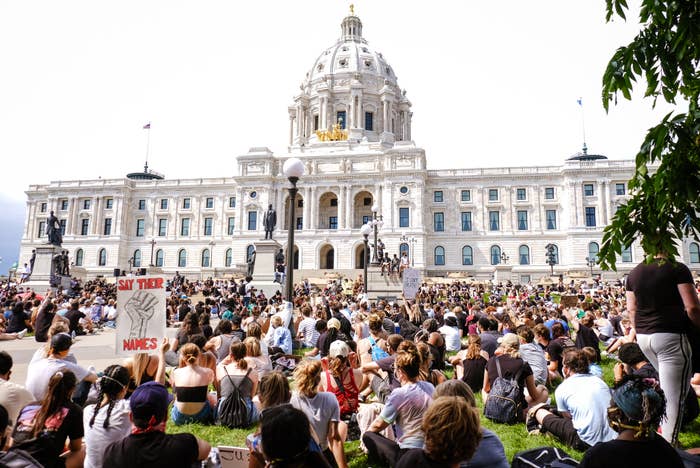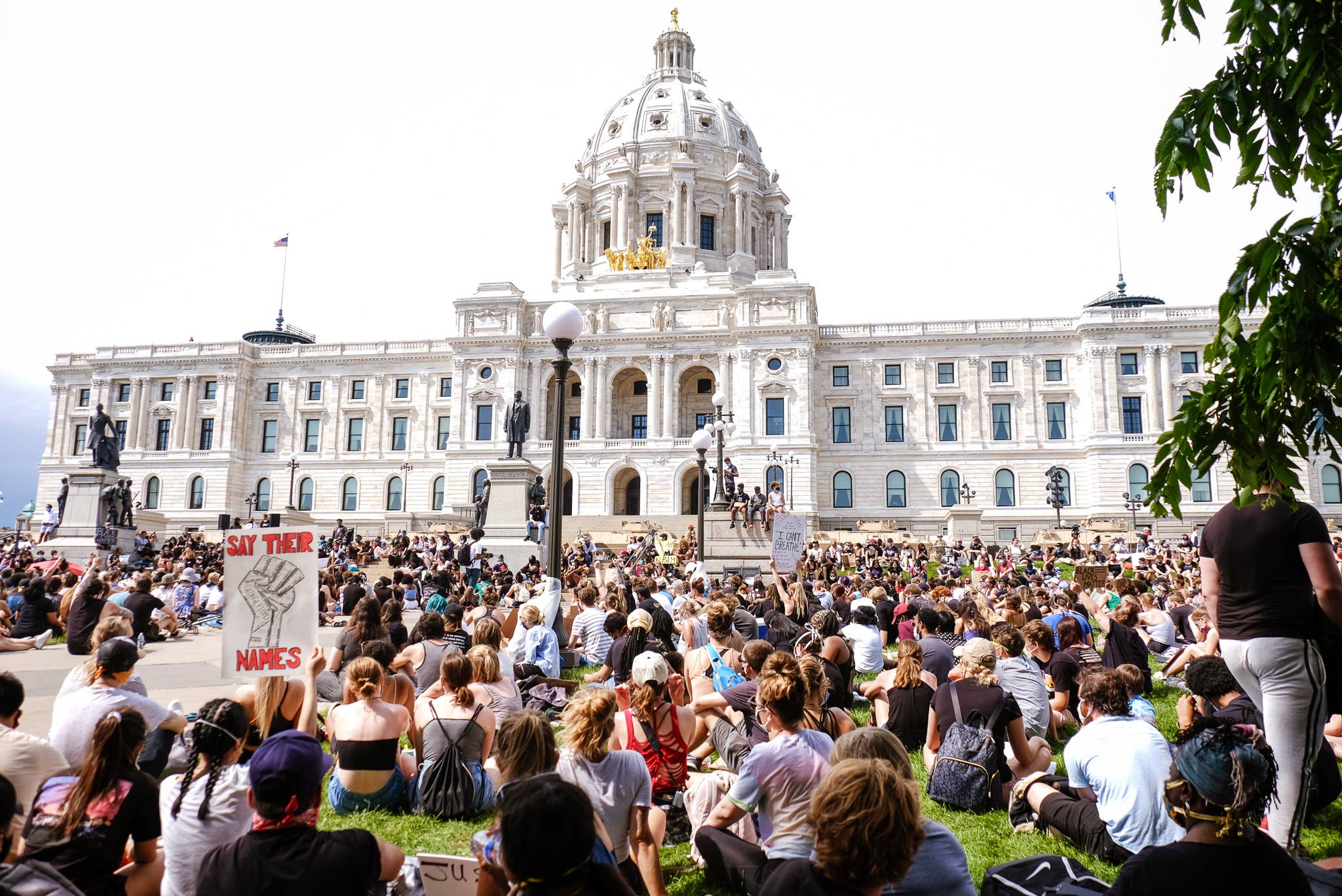
Over the past two and a half months, as much of our country has lived in quarantine, we’ve witnessed the violent loss of black lives with disturbing frequency. Ahmaud Arbery, Breonna Taylor, and George Floyd have died at the hands of racists and law enforcement. Complex Networks recognizes the power of its platforms and is committed to amplifying their stories and the voices of our communities to work for justice.
The bail system has long been one of the largest and most ignored platforms of racism and inequality in the American justice system, critics and bail-reform advocates say.
Its inherent problems, and talk of how to reform or eradicate it, percolated into the national conversation over the last week as tens of thousands of Americans peacefully gathered in cities across the country to protest the police killing of George Floyd and countless other African-Americans. Many protesters found themselves the target of police attacks with flash bang grenades, tear gas, and rubber bullets as officers decked out in tactical gear backed by military hardware sought to disperse crowds past nationwide curfews in an attempt to also root out would-be rioters and looters. Hundreds also found themselves jailed without even the small funds needed to be released.
That’s where groups like the Minnesota Freedom Fund come in. The organization, which posts bail for people and asks them to show up for their court dates so that the funds can be returned, has seen an explosion of support in recent days, raising an estimated $20 million and garnering support and matching donations from celebrities including Noname, Lin-Manuel Miranda, Seth Rogen, Chrissy Teigen, Janelle Monáe, Kehlani, and Yara Shahidi.
The funds are flowing in so fast the organization on Tuesday announced it for the moment would stop accepting money.
“One week ago we were a small bail fund struggling to get anyone to listen about the harms of cash bail and pre-trial detention,” the “Donate” page on its website says. “We are now flooded with resources and we are going to take a beat while we marshal those. We have some big plays in mind.”
Big plays seem needed. The Constitution’s Eighth Amendment prohibits “excessive” bail, yet 34 percent of Americans charged with crimes linger in pretrial detention for no other reason than they can’t afford to pay, according to a 2016 report from Harvard Law School. Making bail can be the critical deciding factor between guilt or innocence, with defendants unable to make bail 25 percent more likely to plead guilty, according to the report, cited in thecrimereport.org.
Here’s what you need to know about the Minnesota Freedom Fund.
Who is behind the organization?
Simon Cecil has been the face of the Minnesota Freedom Fund since its founding. Today it’s led in part by executive director Tonja Honsey, “an incarceration survivor and a community healer [who]... uses her lived experience to advocate for the change that is needed to restore our communities from the trauma of mass incarceration,” according to MFF’s website.
According to 2018 tax documents submitted to the Internal Revenue Service, MFF’s board consists of attorneys Rory Fleming and Kassius O. Benson; Minnesota Department of Health staffer Jenn Andriano; University of Minnesota Law School professor Linus Chan; Michael Friedman, executive director of the Legal Rights Center in Minneapolis; Willy Madeira, an assistant Hennepin County public defender; and Bruce Peterson, a former Hennepin County district judge now teaching law at the University of Minnesota.
When did it start?
Cecil founded the fund in 2016 with a $10,000 grant when he was a 34-year-old University of Minnesota student working on advanced degrees in public policy and business management. At the time, he would spend hours sitting at the exit of the Hennepin County jail in Minneapolis waiting for people to be released after posting bonds sometimes as small as $78, according to a 2017 profile on thecrimereport.org.
In 2018, according to tax documents, MFF paid 113 bonds worth $9,464.
In 2019, MFF and bail-reform advocates across the country won a small victory when Minneapolis’ mayor proposed a no-bail system that would cost the city about $100,000 and pair those charged with low-level offenses with social workers to ensure they showed up for their hearings. It’s unclear whether the program has moved forward within the city bureaucracy.
Prior to the killing of George Floyd, the organization was scrambling to post bail for Minnesota-area inmates as the novel coronavirus began to spread.
“We know these facilities aren’t equipped to deal with this,” Greg Lewin, board president of Freedom Fund, told Minnesota’s Star Tribune. “It’s so obvious that packing people into cages because they can’t pay up is the opposite of flattening the curve. It’s so obviously just an extra layer of immorality.”
What is the organization's message?
On its website, MFF says, “We value a society that values its people, their freedom, and recognizes their contribution to the greater good. A society that does not condition pretrial freedom on class or identity, that has ended mass incarceration, and that invests in restorative and transformative justice.”
The fund argues there’s nothing normal about a cash bail system, which hopes to ensure those arrested show up for their court dates by paying to be released. The organization says the system is also only prevalent in the Philippines, where President Rodrigo Duterte has deployed extrajudicial hit squads to kill thousands of suspected drug dealers across the sprawling archipelago. In 2017, Donald Trump said he and the strongman enjoyed a “great relationship.”
Like other bail reform advocates across the country, MFF argues that cash bail is a form of wealth-based discrimination that extracts money from the country’s most impoverished communities, noting that immigrants and people of color “face higher rates of arrest, harsher sentencing, and disparities in the setting of bail compared to white citizens.”
Where are the funds going directly?
Prior to the outbreak of nationwide protests, MFF spent the vast majority of its funds on posting actual bonds. According to 2018 tax documents, the most recent year available, the organization took in $110,092 and had $152,545 in assets on hand. That same year, it spent $15,401 on expenses including “professional fees to independent contractors and other unnamed expenses.” None of its board members in 2018 received any sort of compensation, nor did executive director Tonja Honsey.
Since the novel coronavirus hit the U.S., MFF has posted bonds for 56 people held in the Hennepin County jail and six from U.S. Immigration and Customs Enforcement detention, according to the Star Tribune. MFF told the paper some they’ve bailed out have been homeless or impoverished and accused of minor, nonviolent crimes—meaning they pose little threat to public safety, but are unable to afford even modest bail, some less than $100.
“All of our funds are going to be used up, because we’re getting as many people out as possible,” said Honsey. “We are on high-alert crisis mode.”
How has the money been used since the riots?
While no official tax documents are yet available and MFF leaders couldn’t be reached, the organization seems to be reassessing how it will operate following the deluge of funds.
“We are no longer the same organization we were one week ago,” it says on its website.
“We will walk with transparency and accountability to use those funds to first and foremost pay bail for those who have shown up in love and grief and rage to demand justice for the murder of George Floyd, and then to post bail in our community for those who are held pretrial simply because they cannot pay and to post bonds to free people from ICE detention. We are dedicated to staying true to our central mission and the intent of these donations—which is freedom.”
How has the Floyd family been included with this fundraising project?
Following the massive influx of money, MFF encouraged would-be supporters to donate directly to George Floyd’s family as well as black- and BIPOC-led organizations like Black Visions Collective and Reclaim the Block. The two are Minneapolis-based organizations that work to push the city to divest from policing and reinvest in long-term alternatives that create wealth and security in overlooked, over-policed neighborhoods.
MFF also encouraged supporters to donate to Rebuild Lake Street to help small businesses rebuild following widespread destruction in the wake of Floyd’s death at the hands of police. As of June 3, more than $4.3 million has been donated.

